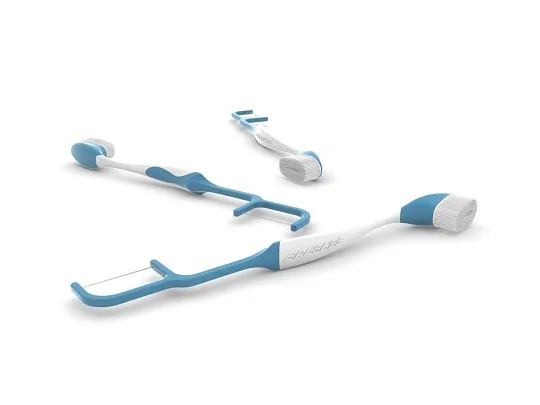A Prevalent but Treatable Problem
Snoring is an incredibly common issue, with over half of men and around 40 percent of women snoring regularly. The noises range from soft whimpers to loud, raspy gasps and snorts that can disturb the whole household.
While snoring can indicate serious health conditions like sleep apnea, it more commonly arises from things like:
- Throat and tongue anatomy leading to obstruction
- Being overweight allowing excess throat tissue vibration
- Alcohol consumption relaxes throat muscles
- Sleeping position causes the tongue to collapse the throat
The good news is snoring can often be reduced without invasive surgical procedures. By making lifestyle changes, trying over-the-counter remedies, and considering newer snoring technologies, peaceful sleep is possible.
The Top 10 Remedies for Snoring Treatment
Lifestyle Fixes for Mild Snoring
Sleep Position
Sleeping on the back allows gravity to pull the tongue backward and partially block airflow. Switching to sleeping on your side can help keep airways open.
- Try sewing a tennis ball into the back of a t-shirt to prevent rolling onto your back.
- Use pillows or wedges to maintain side sleeping posture.
- Raise the head of your bed by a few inches if switching positions is challenging.
Weight Loss
Extra weight allows more throat tissue to vibrate while sleeping. Just a 10% reduction in body weight can decrease snoring frequency and intensity.
- Follow a healthy diet with calorie deficit to lose excess fat.
- Incorporate 150 minutes of moderate exercise like brisk walking weekly.
- Ask your doctor for support and resources for safe, sustainable weight loss.
Avoid Alcohol and Sedatives
Alcohol and sedative medications cause excessive throat muscle relaxation. Avoid consuming them for at least 3-4 hours before bedtime.
Good Sleep Hygiene
Ensure you get enough sleep on a consistent schedule. Being well-rested limits snoring severity.
- Turn off screens 1 hour before bed and make the room cool and dark.
- Go to bed and wake up at the same times, even on weekends.
- Listen to white noise apps or use earplugs if background noise affects sleep.
Over-the-Counter Anti-Snoring Aids
A variety of affordable, non-prescription devices claim to reduce snoring by opening nasal airways or preventing throat tissue vibration and obstruction. Their efficacy varies by individual.
Nasal Devices
- Nasal strips lift open the nostrils to improve airflow. However, results are often mild.
- Nasal dilators like Nozovent mechanically expand nasal passages and increase air intake.
Chin Straps
Worn around the head and chin, these encourage mouth breathing by keeping the jaw closed. Results are mixed.
Tongue Stabilizing and Mandibular Advancement Devices
These devices worn inside the mouth during sleep either hold the tongue forward or bring the lower jaw forward, opening up the airway. Custom-fitted by dentists for best results.
Emerging Snoring Technologies
New, minimally invasive office procedures show promise for stubborn snoring using different energy modalities to shrink and stiffen soft tissues in the throat.
Laser Treatments
Procedures like Nightlase and other laser techniques apply laser energy to the soft palate, triggering collagen production which stiffens tissues and prevents vibration. Multiple treatments are often needed for lasting results.
Radiofrequency
Devices like the Pillar Procedure and Coblation technology use radiofrequency energy to structurally modify and shrink the soft palate to open airways. Studies show noticeable improvements in snoring, though side effects like pain can occur.
Injection Snoreplasty
In this office treatment, natural substances are injected into the soft palate to cause scarring and stiffening. Though minimally invasive, the injections can be painful and results fade over 1-2 years.
Exercises for Throat and Tongue Muscles
Performing targeted exercises and practices may strengthen the throat enough to prevent collapse during sleep. Consistency is key for seeing benefits.
- Sustain vowels like “Aaaahhh” to tone soft palate and tongue
- Place tongue tip on roof of mouth and slide forward and backward
- Open mouth wide and pucker lips in and out
- Chew motions with jaw strengthen throat muscles
- Try yoga poses like Plow, Fish, and Lion’s breath to increase muscle control
When to Seek Specialist Care
Consult your physician if you have exhaustion, headaches, and loud snoring, as this may indicate sleep apnea. A sleep study can diagnose the condition, and CPAP machines which deliver air pressure through a facial mask can provide relief. An ENT doctor can also evaluate your throat anatomy for obstruction.
While frustrating, snoring can often be improved with determination. Try adjustments like side sleeping and weight loss first, then consider over-the-counter or technology aided solutions if snoring persists. With experimentation, peaceful sleep is possible.



